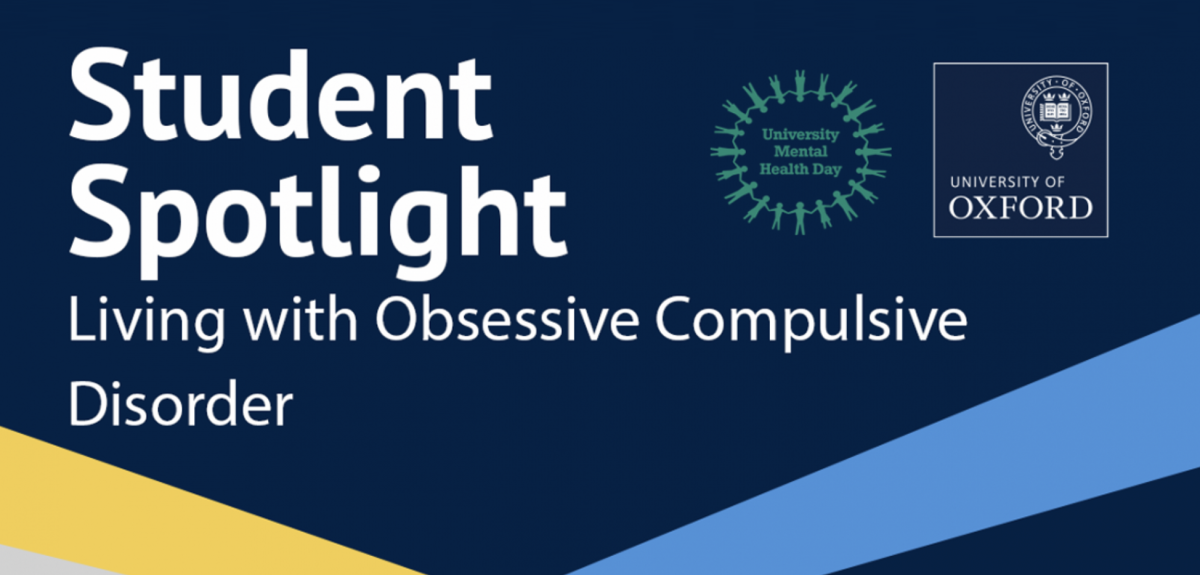
Student Spotlight: Living with Obsessive Compulsive Disorder
Aaron Hammond Duncan is a third year English Language and Literature student at St Hilda's College, and for this year's University Mental Health Day (Thursday 3 March), has shared his experience of suffering from severe depression and Obsessive Compulsive Disorder (OCD or 'Pure O').
Living with Pure O
The best way for me to explain Pure O (or Pure OCD – Obsessive Compulsive Disorder) is firstly to tell you that organising your pens on your desk, so they look pretty, or being mildly irritated that someone didn’t fully clean the whiteboard does not mean that you have OCD. No, OCD is not the luxury of being able to choose whether your stationary looks neat but an inescapable dread and anxiety when compulsions are not or cannot be fulfilled. It will reduce you to a one-track record, endlessly looping right at the moment when you think you’ve gained a few minutes of solitude.
Living with OCD is living with a permeant roommate playing the drums in your head, 24/7. It doesn’t care if you’re upset. It doesn’t care if you’re angry. It doesn’t even care if you’re at the point of suicide. It cannot be predicted, nor can it be easily satisfied. Ritual is the only method of protection: you’ll find yourself breathless every day, repeating the same walk to the fridge over and over (did I step with left foot or my right first? Does this mean my dad will die?) and you’ll turn the lights on and off to ensure that you don’t have AIDS. And that’s the scariest part – its completely irrational.
A constant assault on the mind
Pure O (OCD) is a variation of OCD that means the sufferer lives with constant intrusive thoughts, and compulsions that have no logical basis. They are a constant assault on the mind and leave those who suffer mentally fatigued and unsure of their own identity. Pure O is different for every sufferer so I will only talk about my own experience in a hope to encourage others to do the same. Having lived with Pure O for the past 7 years I am still significantly affected every day.
As a quick game, try to picture the worst conceivable thing imaginable to you. Got it? Great, now I can imagine that was not a pleasant experience, even for that short period; but now try to imagine doing this involuntarily, over and over every minute of the day. Your mind becomes your worst enemy, generating images of the most despicable acts and situations humanly possible to torture you with. It brings you to the point where you begin to question your own sanity and beliefs. Am I going to die of cancer? Do I really want to jump off this bridge? On the page I can censor what I write, erasing content deemed too offensive or shocking – but in the mind of a Pure O sufferer there’s no such grace.
Seeking help
While it is such an unknown and taboo illness and causes such debilitating effects, there is support for those who need it. Cognitive Behavioural Therapy and medication are available for those who are lucky enough to have access to a doctor. Sadly, this process will always rely on the individual wishing to seek out help and fails to support those that may have the illness and not even know it. It is those within this category that pose the greatest risk of developing depression, further anxiety issues and ultimately risk suicide, for lack of understanding of their own illness.
That is why education is so important, why talking about Pure O, OCD and depression can begin to tackle the ingrained taboo that prevents so many from seeking help and help prevent so many from dying so tragically young. I hope from giving my experiences, I can help others fight against the stigma against mental illness and help pave the way for a brighter future.
There is a range of free mental health support available to all Oxford students via the University's Counselling Service and Student Space.
Visit Aaron's personal website and Instagram.
 Trinity exams: your essential preparation checklist
Trinity exams: your essential preparation checklist
 Trinity exams: what to expect on the day
Trinity exams: what to expect on the day
 2023-24 Student Welfare and Support Services reports show demand for services remained high
2023-24 Student Welfare and Support Services reports show demand for services remained high
 Transcript: Vice-Chancellor's end of Hilary 2025 student message
Transcript: Vice-Chancellor's end of Hilary 2025 student message
 Easter vacation welfare support
Easter vacation welfare support